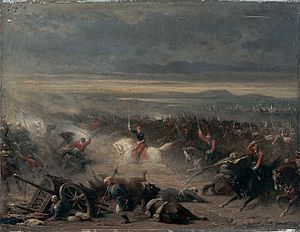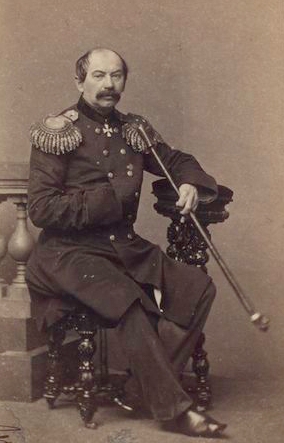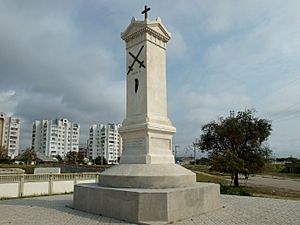Battle of Eupatoria facts for kids
Quick facts for kids Battle of Eupatoria |
|||||||
|---|---|---|---|---|---|---|---|
| Part of the Crimean War | |||||||
 Battle of Eupatoria by Adolphe Yvon |
|||||||
|
|||||||
| Belligerents | |||||||
| Commanders and leaders | |||||||
| Strength | |||||||
| 31,600 Turkish infantry, cavalry, and artillery 1,000 Tatars 276 French Sailors 34 Cannons 4 British steamers 1 Ottoman frigate 1 French frigate |
17,924 Russian infantry, cavalry, and artillery 634 Greek volunteers 325 Cossacks 108 Cannons |
||||||
| Casualties and losses | |||||||
| 91 killed 286 wounded |
168 killed 583 wounded 18 missing |
||||||
The Battle of Eupatoria happened on February 17, 1855. It was a big fight during the Crimean War. The Russian army tried to take the city of Eupatoria in Crimea. But the city was held by the Ottoman army. The Russians tried hard but could not capture it.
Contents
What Led to the Battle?
In March 1854, Britain and France joined the Ottoman Empire in the Crimean War. They declared war on Russia. In September 1854, their armies landed in Crimea. Their main goal was to capture Sevastopol. This was Russia's big naval base on the Black Sea.
By mid-October, the Allies had surrounded Sevastopol. They started a long siege. Both sides sent more soldiers to Crimea. Russia sent troops over land. The Allies brought their soldiers by ship across the Black Sea. Eupatoria was one of the main places where Allied soldiers landed.
In December 1855, Tsar Nicholas I of Russia was worried. He wrote to Prince Alexander Menshikov. Menshikov was the Russian commander. The Tsar feared that more Allied troops at Eupatoria could cut off Crimea from Russia. Eupatoria was about 75 kilometers north of Sevastopol. If the Allies took it, they could stop supplies and messages from reaching Russian forces.
So, Tsar Nicholas told Prince Menshikov to capture Eupatoria. If they couldn't hold it, they should destroy it. Menshikov chose Lieutenant General Stepan Khrulev to lead the attack. Khrulev was an artillery officer. He was known for following orders exactly.
Armies and Plans
General Khrulev checked out Eupatoria many times. He saw that the city was well-protected. It had a strong earthen wall and a ditch around it. There were 34 cannons along the walls. Since the city was on the Black Sea, Allied warships in the harbor also protected it. Outside the walls, the land was mostly empty. Many buildings had been taken apart for firewood.
Inside Eupatoria, there were about 33,000 defenders. Most were Turkish soldiers. There were also 1,000 Tatars and 276 French sailors. The Turkish forces were led by Omar Pasha, a skilled military leader.
Khrulev planned to attack with three groups of soldiers. The main attack would be in the middle, at the north wall. This area was safer from naval attacks. The other two groups would attack the sides of the city. This was meant to distract the defenders. The left side attack would start first, then the right. If it worked, the Russians would break through the middle.
Each of Khrulev's three groups had about 5,000 foot soldiers and 36 cannons. The groups attacking the sides also had over 2,200 cavalry (soldiers on horseback). Khrulev had almost 19,000 men in total for the battle.
The Battle Begins
On the evening of February 16, Khrulev moved his soldiers quietly. They got within 3.5 kilometers of Eupatoria's walls. Riflemen and Cossacks went ahead as lookouts. The rest of the men silently built wooden shelters for their cannons. The darkness and the land hid them from the Turkish guards.
As dawn came, Khrulev rode his horse to the front. He led the left group forward. They were about 1,300 meters from Eupatoria's walls. But the Tatars on watch saw them. They ran back to the city, sounding the alarm. Khrulev had wanted a surprise attack. But the Turks knew an attack was coming. They were already ready on the walls.
Around 6 AM, the fighting started. The Turks began firing their cannons and rifles. The Russians quickly fired back with their own cannons. For about an hour, both sides shot at each other. Khrulev brought more soldiers to the left side. He moved his cannons closer, to within 500 meters of the walls. He focused his cannon fire on the Turkish center.
The Turkish cannons were bigger. But the Russian artillery started to do some damage. When the Turkish firing slowed down, the Russians advanced. Five groups of foot soldiers moved toward the city walls on the left. This included a group of Greek volunteers fighting with the Russians. They used the ruins of a cemetery for cover. They got within 400 meters of the ditch in front of the walls.
The Russian soldiers carried tools to cross the ditch and climb the walls. They quickly moved to the ditch. But they were under heavy fire from the city walls. Allied warships in the harbor also fired at them.
At this point, the attack stopped. The ditches were full of water and too deep. The Russians could not climb the walls. After many tries, they had to retreat back to the cemetery. The Turks saw this. They sent soldiers and cavalry out of the city to chase the retreating Russians.
Khrulev quickly realized they could not cross the ditches. He decided Eupatoria was too strong to capture. He ordered his forces to retreat. The other Russian commanders wanted to keep fighting. But Khrulev's order stood. The retreat began in an orderly way around 10 AM. Khrulev led his defeated army to the hills east of the city. Omar Pasha sent some soldiers to follow them, but only to watch.
The Russians had more losses than the Turks. Russia lost 168 killed, 583 wounded, and 18 missing. The Turks lost 91 killed and 286 wounded. General Selim-Pasha was among the Ottoman dead.
What Happened Next?
When Tsar Nicholas I heard about the defeat, he was very sad and disappointed. He was already sick. This news seemed to break his spirit. He died shortly after, on March 2, 1855. His son, Tsar Alexander II, took over. He removed Khrulev from command. He also replaced Prince Menshikov as the main Russian commander in the Crimean War.
Some people thought the war would end soon after Tsar Nicholas died. But Tsar Alexander II did not seek peace right away. The Battle of Eupatoria showed something important. The Allies controlled the Black Sea. This meant they could keep threatening Russia's side in Crimea. For the Allies, holding Eupatoria also meant they could continue their siege of Sevastopol.
Images for kids
 | Misty Copeland |
 | Raven Wilkinson |
 | Debra Austin |
 | Aesha Ash |




